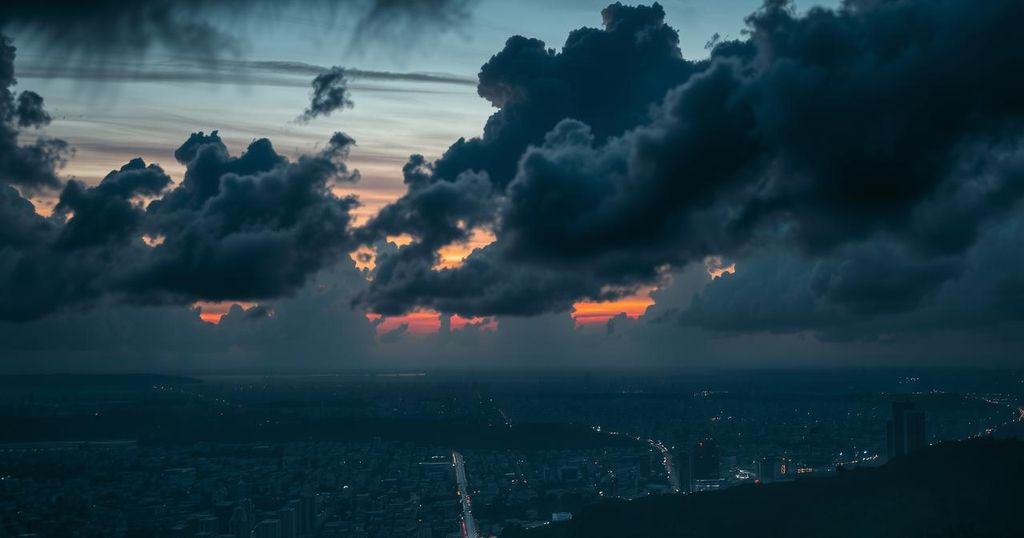Escalating Conflict in DR Congo: M23 Rebels Seek to Capture Kinshasa
M23 rebels, allegedly supported by Rwanda, have claimed the capture of Goma and are advancing towards Bukavu, seeking to reach Kinshasa. The United Nations has noted the rapid movement of M23 troops, raising concerns about escalating violence and its effects on the humanitarian situation. The DRC government dismisses talks with rebels, while humanitarian crises deepen amid escalating conflict.
Rebels from the M23 group in the Democratic Republic of the Congo (DRC), reportedly backed by Rwandan forces, have declared their intention to advance towards Kinshasa after claiming control over Goma. This development marks a significant escalation of the conflict in the east of the DRC, particularly following a violent week that saw fierce fighting resulting in numerous casualties and the capture of key locations.
On Thursday, rebel leader Corneille Nangaa announced their full commitment to liberate the nation, stating, “We will continue the march of liberation all the way to Kinshasa.” Reports indicate that M23 fighters are nearing Bukavu, the capital of South Kivu, while local sources highlight their proximity to the strategic Kavumu military airport. The United Nations has expressed serious concern regarding the rapid movement of M23 fighters toward Bukavu, a city with two million residents.
Analysts suggest that the M23 is among numerous armed groups vying for control in eastern DRC. According to UN experts, these rebels are supported by approximately 4,000 Rwandan soldiers. In contrast, Rwanda claims its military operations are aimed at combating groups linked to historical genocides, asserting that they act in self-defense against threats to its security.
Although the M23 has indicated a willingness to engage in dialogue with the DRC government, Congolese Defence Minister Guy Kabombo Muadiamvita dismissed any prospects for negotiations, urging that such plans be “burned immediately.” In light of the escalating situation, the Southern African Development Community convened an emergency summit to address the rising tensions, especially following the casualties among South African troops.
The humanitarian situation in the DRC continues to deteriorate with Goma facing significant shortages of electricity and water. The violence has displaced half a million people this month alone, exacerbating an already critical humanitarian crisis. Amy Pope, director general of the International Organization for Migration, noted the severe impact of ongoing conflict on vulnerable populations, stating that “an already dire situation is rapidly becoming very much worse.”
The ongoing conflict in the eastern Democratic Republic of the Congo (DRC) has drawn international attention, particularly due to the involvement of Rwandan forces and the rebel group M23, which has resurfaced amid accusations of resource exploitation and ethnic violence. With a history marked by civil war and international tensions, the area remains a hotspot for multiple armed factions, complicating peace efforts and exacerbating humanitarian crises. The M23 claims to fight against the Congolese army, which they accuse of allying with forces responsible for atrocities against minority groups. This complex backdrop involves historical grievances between ethnic groups, the legacy of the Rwandan Genocide, and broader regional security concerns, making the situation increasingly volatile and challenging to resolve. The involvement of regional powers such as Rwanda and the implications for local communities highlight the urgent need for diplomatic interventions to restore stability.
The current situation in the Democratic Republic of the Congo reflects a severe escalation in conflicts driven by both local and regional dynamics. With M23 rebels threatening to capture further territory and rejecting negotiations, the implications for regional stability are profound. The humanitarian toll continues to rise amidst a dire crisis, necessitating immediate action from the international community to address ongoing violence, support affected populations, and facilitate dialogue among conflicting parties.
Original Source: www.aljazeera.com




Post Comment